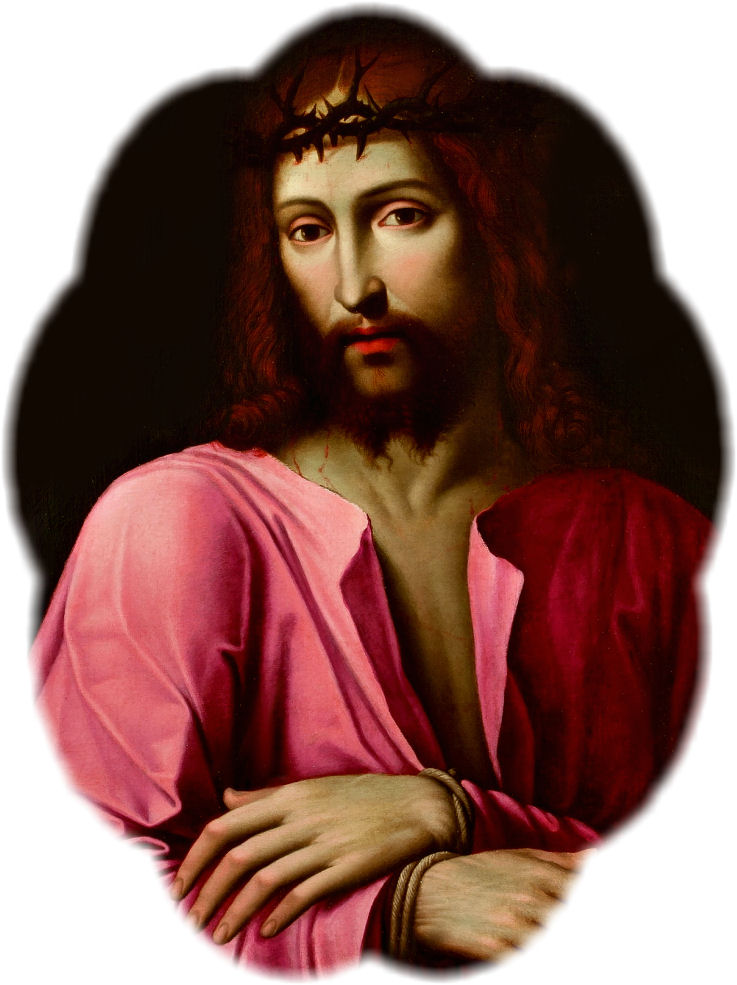

Excerpts from MEDITATION ON THE PASSION
Rev. Reginald Walsh, O.P.
Burns Oates & Washbourne LTD, London
with Nihil Obstat and Imprimatur, 1922
TRIAL AND CONDEMNATION AT THE COURT OF CAIPHAS
See the persons, listen to the words, note the actions.
Caiphas was seated in the centre of the raised platform, and seventy members of the Sanhedrin were placed around him - namely, the Priests, the Scribes, and Ancients - standing on either side, and the false witnesses were behind them. The countenance of Caiphas was solemn in the extreme, but the gravity was accompanied by signs of suppressed rage and sinister intentions. Both the time and place of this assembly were contrary to law, but the resolve to do away with Christ made the law of no account now.
Contemplate our Blessed Lord as He reaches the council chamber. Hear Caiphas exclaim in a loud voice: "Thou art come, then, at last, Thou enemy of God, Thou blasphemer, Who dost disturb the peace of this holy night." Then the trial begins in a way not usual in such cases. Instead of giving our Lord a counsel for His defence, hearing the evidence in His favour, formulating the accusation definitely and confirming it by witnesses, the High Priest began immediately, probably through embarrassment, with a cross-examination of our Lord concerning His doctrine and disciples. Jesus was to declare Himself with regard to these points. "The High Priest therefore asked Jesus of His disciples, and of His doctrine."
This cross-examination was (1) quite superfluous, for the condemnation of Jesus was a foregone conclusion; (2) it was very unjust, for no defendant is bound to accuse himself; (3) it was very crafty, because they only hoped to find something in His answers that could be turned against Him. The High Priest and the Council were obliged to examine the witnesses, for the law required that at least two witnesses should agree exactly. Our Lord's enemies had already been on the lookout for witnesses, and false ones, too - "For many bore false witness against Him," St. Mark says. A great many hired witnesses appeared at the prosecution. We are not told all that they said against our Lord, but whatever it may have been, it was false, malicious, invented, or at least misrepresented; and as the witnesses were heard separately, according to the ordinary judicial usage, the result was deplorable. Their statements did not agree even in the main points, and no use could be made of them.
At last two witnesses appeared, who stated that Jesus had said, speaking contemptuously of the Temple; that He would destroy it and build another, not made with hands, within three days. This is supposed to be the answer given by our Lord on the first paschal feast during His public ministry, when the Priests asked Him by whose authority He had dared to cleanse the Temple. This evidence was also false, as regards the words and sense. Our Lord's answer on that occasion had been, "Destroy this Temple," not " I will destroy it," and He had been referring to the temple of His Body. These men had learned the ways of their master, the devil, Satan, when he deceives, always mixes up a large element of truth with his deceits. This is why we should never argue with him, for he can represent what is false and unlawful as true and right if once we listen, by bringing into prominence the elements of truth it contains. These false witnesses, in spite of their cunning, could not agree, but one contradicted the other. It is one of the certain tests of error, that it is inconsistent and self-contradictory - jarring discord is the mark of the enemies and foes of Christ; peace and concord are the privilege of those who are on His side.
And how did our Lord behave in the face of this evidence? He was silent. Jesus held His peace, and answered nothing. Even when the High Priest, in order to get some avowal from Him, asked what He had to say to the statements of the witnesses, He was silent, and spoke not a word of reply.
And why did Jesus give no answer? (1) It was wise and prudent of Him to act thus, for any answer of defence would be unnecessary and quite useless in the present disposition of the Council; and (2) Jesus' silence teaches us fortitude and humility. Our Lord wished to set us an example not to be too eager in our own defence, and also to satisfy for the faults and sins which eagerness to justify ourselves causes us to commit. Let us remember St. Ignatius' advice: "Always receive correction or reproof with faith, showing humble, reverent silence, and submission." And this, that we may be more like Christ.
"Jesus was silent!" Oh, what a useful, what a necessary word is this one dictated by the Holy Spirit: Jesus was silent! Jesus held His peace. Most useful to me is the study of the meek and victorious silence of Jesus. If I am silent, reverent, humble, particularly when I'm accused or corrected, God not only speaks for me, but also to me in prayer.
"Answerest Thou nothing?" said Caiphas. See how all these most unwise councilors fix their eyes on Jesus during this appeal from the High Priest. In spite of His chains and bonds they feel in the core of their hearts, and in the marrow of their bones, that they are in the presence of their Master. They murmur in their hearts: "Do you see that we prevail nothing?" "Answerest Thou nothing?" All the while the silence of Jesus is speaking powerfully - it will speak powerfully to all His servants to the end of time; His chains are speaking; His pale face is speaking; His weary body is speaking - weary, yes, most weary, for He has been dragged hither faint and exhausted, and He is now standing all this long time, while His judges are seated.
Then Caiphas, rising from his seat, approached Jesus and said: "Answerest Thou nothing to the things which these witness against Thee?" Jesus neither raised His head, nor looked at the High Priest, which greatly increased his anger. Then Caiphas, raising his hands, exclaimed in an enraged tone: "I adjure Thee, by the living God, that Thou tell us if Thou be the Christ, the Son of the living God." The intention of Caiphas in this solemn adjuration is wicked. He desires to deliver up our Lord to certain death for blasphemy. A momentary and solemn pause ensued. Then Jesus in a majestic and superhuman voice replied: "Thou hast said it. I am. Nevertheless I say to you, hereafter you shall see the Son of Man sitting on the right hand of the power of God, and coming in the clouds of Heaven."
The question had been put in official form, as solemnly as possible, so our Lord was bound to give answer - silence would have been tantamount to denial. Scarcely had our Lord given His answer when the High Priest rose and declared it blasphemy: "He hath blasphemed!" And in order to show his indignation and inspire those present with the same holy anger, Caiphas rent his upper garment from top to girdle, as was often done on occasions of great horror or mourning. Then turning to the members of the Great Council he cried: "You have heard the blasphemy; what need have we of any further testimony? What think ye ?" But they, answering, said: "He is deserving of death." And they all declared Him to be deserving of death.
With this the trial ended, the facts established, our Lord found guilty of blasphemy on His Own evidence, and the motion for punishment of the crime formulated. The Council could be well satisfied with the result of its work. All was now in readiness for the final sentence of the Great Council, which had to be passed in the day time. The whole proceeding was a mockery - a comedy - a mere travesty of right and justice, a false court over which the most unblushing malice and hypocrisy reigned supreme. Does it not show me how far envy, insincerity, and infatuation can go? How these Pharisees and sinners, whom our Lord had corrected and threatened, wreaked their long-suppressed jealousy, revenge, and fury upon Him now that they had Him in their power!
See Jesus - fettered, bound, in pitiable plight, He stands among them - a helpless lamb, at the mercy of their teeth and claws. And yet Jesus stands as high above them as God above man, and the dark and stormy background of this scene in the court only serves to throw out the glorious outlines of His figure and the fortitude and love of truth and love of us that He displays in the glorious testimony to His Divinity.
This testimony is of the highest importance and significance:
1. For the Jews. It was necessary that they should have it, for otherwise their belief would have taken refuge behind the less plain statements of Jesus with regard to His Divinity. Now they had no excuse. They had a clear, plain, and unequivocal answer - an answer so solemn and official that it left nothing to be desired.
2. For our Lord Himself also. It is the sum-total of all His doctrine, the explanation of His miracles, and the seal of His holiness, His truthfulness, His obedience and love of His Father, His constancy, and fortitude; for it was no slight matter to confess His Divinity in His present state of weakness and abasement.
3. For the whole creation. Heaven exulted with joy. Hell trembled and quaked, and felt its judgment in these words; and the farthest ages and ends of the world began to revive and sun themselves in the beautiful light of this saving truth. Such is the grand testimony of our dear Lord and Master - our Jesus. Eternal thanks be to Him for it!
He is deserving of death! How much these words mean to us - to me - "He loved me, and delivered Himself for me!"
COLLOQUY. - What have I done for Jesus, my Lord and my God? Shall I not give myself up to Him? Shall I not die to the world and myself for Him? What does my Divine Master see in me that is most opposed to His love? Am I making any reserve in my devotion to Him? Can He find joy in my fidelity to Him? Can Jesus look on me and say -"He loves Me and delivers himself up for Me?"
O most kind, a most sweet Lord Jesus! from my heart I return Thee thanks for calling me to Thine immediate, personal service. Draw me closer and closer to Thee. Help me by Thy love to die wholly to myself that I may live for Thee alone. Grant, I beseech Thee, my dear Jesus, that from this moment I may be wholly Thine, and Thou wholly mine; that I may wholly sacrifice my life for Thee and live according to Thy good pleasure - to please and satisfy Thee in all and by all, O Sacred Heart of Jesus, in Thee I trust; O my Mother, I have need of thee!


HOME ------------------------------------------------------------------------------------------------------------------------------------------------------------------------------------------------------------------------ CHRIST THE KING
www.catholictradition.org/Passion/passion34b.htm